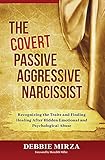Podcast: Play in new window | Download (Duration: 35:56 — 24.8MB)
Subscribe: Apple Podcasts | Spotify | Amazon Music
Holding Your Own with Challenging Personalities – staying (or becoming) secure in relationship with those with covert narcissism.

Session 3 – Staying secure in connection with one kind of narcissism: covert narcissism
When does self-consciousness and self-reflection cross the line into self-preoccupation? Covert narcissism is also called thin-skinned, vulnerable, depressed or closet narcissism. It's a real thing but unlike grandiosity, it's quite hard to spot! Think about it – if you feel when you walk in a room everyone is looking at you – admiringly or judgmentally, either way – that is a narcissistic fantasy. Today's episode follows the other side of grandiosity. Find more here www.therapistuncensored.com/episodes
Co-hosts Ann Kelley and Sue Marriott have launched a new series titled “Holding Your Own with Challenging Personalities.” Together, they’ll sort out the differences between the various forms of narcissism – grandiose, covert and malignant, as well as look at what has been called borderline traits. The goal of this series is to bring you the skills and practices that help you ground and stay in your secure self no matter what is swirling around you.
This series builds on itself so we recommend that you listen to Sessions 1 and 2 first before jumping into this episode, but if that isn't your cup of tea, then by all means, the episode will be solid on it's own.
To start at the beginning & hear the previous episodes in the series click here: TU132 HYO Session 1 Messy but Secure Relating and TU133 HYO Session 2 Grandiose Narcissism.
Covert Narcissism
It has so many different names: vulnerable, thin-skinned, depressed narcissism… it's a real thing but unlike grandiosity, it's quite hard to spot! That's why they call it “covert.” Sometimes, somebody in the corner that looks like they're avoiding and shunning attention can make us focus our attention on them. There is an ability to be very loud while staying very quite.
What's the difference? Why are they both called Narcissism?
- Covert narcissism is something many of us can relate to – super self-conscious about imagining everyone judging us – negatively. Yet it's still special, just negatively special. We all do that at times but it's a matter of degree – how self-centered and self-focused are we?
- All narcissism is about our relationships with shame. For grandiose narcissism, shame is projected out into other people. But in covert narcissism, shame is being pulled in from all around us as another form of being exceptional.
- Because of the way covert narcissism uses shame, it is also sometimes called depressed narcissism. So what's the difference between depression and covert narcissism? Depression is often an utter depletion, a flatness in your body where you feel empty, but still have a sense of self. Simply put, it's you that's bad. Cover narcissism on the other hand pushes those feelings outward, and often losses the sense of self. It's more of a feeling of bitterness and like something was done to you. Simply that it's the world that's bad to you.
- Often, this is associated with achievement. A covert narcissist might thinks they must be the most attractive in the room, and if they aren't that, then they are at the bottom of the pile. They've tied their sense of self and their self-esteem to the approval of others.
- This really comes from how we're valued through our development. If we're valued because of what we can bring to someone else, it's really hard to feel the development of a true sense of identity. Instead, a covert narcissism unconsciously needs to bring the negative attention towards themselves to create rescue ie attention, thus providing a sense of worthiness. Sounds odd we know, but it's true. They are highly sensitive to rejection and overly personalize – there you can see the narcissism, it's all about them and their injury.
How can you tell you're dealing with a covert narcissist?
If you're being used to maintain someone else's self-esteem that signal of narcissism in general. If not getting filled by that extension, there is a desperate sense of emptiness right below the surface. Importantly, a covert narcissist can often come across as the victim which can initially bring out a lot of sympathy.
Really ask yourself, how many people are in this relationship? Are you orbiting the other, walking on egg shells? In a relationship with a covert narcissist you can really lose your own sense of self and own identity. You can become afraid of celebrating your success, or feel the need to downplay an achievement of yours in order to not upset your partner. If you start to hold yourself the other person may feel threatened at the differentiation.
What can you do in the face of covert narcissism?
- Most importantly, we should help people with covert narcissism find their sense of agency.
- This includes an imperfection.
- Instead of identifying the external situation that was done to someone, we can turn towards identifying their own role in a situation. Challenge the internal narrative that they are the victim of some external harm. The idea is to build up their own sense of self and creates a more complete identity not tied to other relationships or people.
- In fact, if we join with their experience too much, and are overly agreeable, that can often aid the feeling of victimization. When you move to hold the other person at the expense of you, usually trying to protect their feelings, it doesn't help move out of the narcissistic dynamic.
- Also, you can start to hold your own. Take a breath, maybe one or two or ten, and settle down to avoid just getting into a fight. Don't just push off and leave them high and dry with their envy or pain, but also make sure you're not going to collapse completely and protect their feelings.
- The big take away from all of this is helping people move into a stable in-between space.
- You aren't the greatest best person ever, but you also certainty not the worst. We're all human, with our own identities and imperfections and that's all okay!
Why a podcast series?
Our normal episodes serve as great snack packs of information about a wide range of topics, but don’t often let us go into as much depth as maybe we could. We had originally planned to create a course on narcissism and healthy relationships that would really allow us to dig deep and unpack this all at a level that a regular podcast just wasn’t able to do. But given the nature of the content and the times we’re living in we decided to bring you all that course FOR FREE in the form of this new mini-series that we’re doing here at Therapist Uncensored! We’re still working out all the kinks on this new format for all of you so feel free as always to hit us up with any feedback on how this new format is working!
Our plan is to release episodes much more frequently through the series and then go back to our every other week format.
Nobody fits in a box!
In this series we set the stage and call out pathological use of labels and diagnosis. We begin with secure but messy relating and then wade into the various traits that can become personality based on degree.
Resources
This is not our first rodeo, see these previous episodes on the subject:
To start at the beginning, listen to the previous episodes in the series: TU132 HYO Session 1 Messy but Secure Relating and TU133 HYO Session 2 Grandiose Narcissism.
 |
TU 111 Navigating Narcissitic Relationships Manipulation Gas-Lighting and Grandiosity Called Out
TU107: Narcissism – What's Going on Underneath the Defense?
TU107: Our Powerful Fascination with Narcissism in the Era of Trump
TU 23 Building Grit through Self-Compassion with Kristin Neff
Attachment Disturbances in Adults Comprehensive Treatment & Repair (2016) Dan Brown and David Elliott
(This is Sue's favorite textbook on attachment currently)
Traumatic Narcissism the Relational Systems of Subjugation by David Grey














